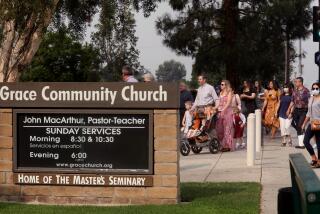Cypress Nears Land Deal With Church
- Share via
Cypress and Cottonwood Christian Center appear close to settling their nationally watched feud over the city’s effort to use the church’s land for a tax revenue-generating Costco.
Under the proposal, the church would get a larger property nearby, on what is now the Cypress Golf Course. The city would take over the 18 acres at the intersection of Walker Street and Katella Avenue, where Cottonwood had planned to build a mega-church for its 4,000 members, then would sell that land to Costco or another “big box” retailer.
“There is great potential there,” said the Rev. Mike Wilson, project manager for Cottonwood, adding that the golf course is “a fine site.”
Such a settlement would cut short what has become a national test case of the Religious Land Use and Institutionalized Persons Act, a 2000 federal law that exempts churches from most local zoning regulations.
City officials contend that the church bought the property in 1999 despite warnings that it was in a redevelopment zone where Cypress planned a large retail center--warnings the church said were never made.
Church leaders nationwide have accused the city of discriminating against Cottonwood. Land use experts from the American Planning Assn. and elsewhere have rallied around Cypress, saying a Cottonwood victory in court would give religious institutions carte blanche to wreak havoc with local planning.
This month U.S. District Court Judge David O. Carter ordered Cypress to stop its condemnation proceedings pending a trial in March. Carter’s opinion chastised the city for its heavy-handedness in moving to take the property. Carter warned the city that it may be violating the new federal act.
The ruling has increased pressure on the city to settle, because Carter would be the trial judge. Tuesday afternoon, city and church officials held settlement talks for the first time since the ruling.
The 28-acre portion of the golf course that would become the church’s is now owned by Ed Allred, who also owns the adjacent Los Alamitos Race Course. Allred says he would sell Cottonwood most of the 28 acres for $17 million and donate the rest to the church for a tax break.
“A lot depends on whether the city can pay enough to the church for its land to make this possible,” Allred said. “They seem to be fairly close to a meeting of the minds.”
Church and city officials said they could not disclose financial details. Negotiations had been slow until a few months ago, mostly because Cottonwood was unable to find affordable properties in north Orange County suitable for the 300,000-square-foot church it plans.
After Allred purchased the golf course in the spring, he pitched the land swap to the church and the city as a feasible alternative. Allred would not disclose how much he paid for the 92-acre golf course but acknowledged that he would profit in the church deal. He would use the rest of the golf course for other development projects, he said. “We had no idea it was even on the market,” Allred said of the golf course. “It works out perfectly. It solves a lot of problems.”
The city had earlier tried to take the church property for $14.5 million through eminent domain. Under the proposed land swap, the city would have to pay the $17 million Allred is asking and possibly reimburse the church for what it has spent at its existing site on planning and design, accumulated interest and attorney fees.
City officials downplayed the higher cost of the land, saying the $14.5 million was always a starting point from which to negotiate.
Whether the city can afford the new price may depend on what Costco is willing to pay for the land the church would be leaving.
“We are in negotiations with Costco as to how a potential deal might look,” said David Belmer, Cypress community development director. He said the city may ultimately offer Costco or some other retailer a tax break to make the swap possible.
“The city will put a deal together that in our opinion makes sense,” Belmer said. “There will be no subsidies unless there is a reasonable return on our investment.”
If the land swap can be worked out, it will cement the city’s redevelopment plan. Much of the redevelopment zone lies in property that Allred owns, and he is working with the city on plans to transform asphalt-covered lots and a barely profitable golf course into a bustling retail district.
Allred plans to build several shops on 13 acres connected to the proposed Costco as well as a pod of restaurants on a 2-acre site nearby. Marriott has already put a hotel in the area, and another builder might put in a fitness center.
The church would take up a third of the golf course. The rest, Allred said, could be used as housing and a training facility for the racetrack.
“We think this is a solution that works out for everyone,” he said. “The city just needs to give the church enough money to make it happen.”
More to Read
Sign up for Essential California
The most important California stories and recommendations in your inbox every morning.
You may occasionally receive promotional content from the Los Angeles Times.














